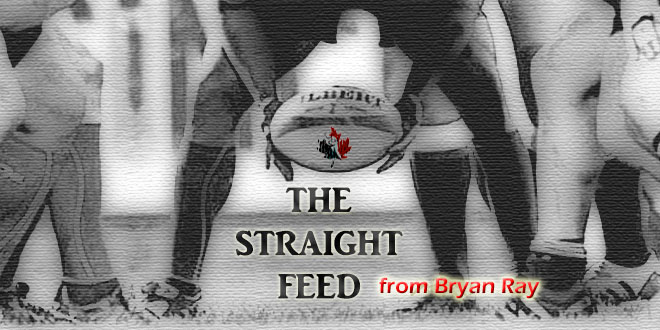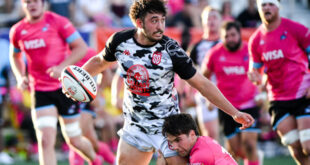It’s now July 4. Independence Day for those who hail from South of the 49th. Or holed up at the Alaskan Mountain Grounds. The Eagles have now been celebrating for the best part of three days straight. Not only did they steal Canada’s spot in the World Cup, they also stole a national holiday.
Of course it wasn’t theft. No robbery took place. A brutal beat-down definitely did. Canada were trampled. Emphatically humiliated. Is this the lowest point in Canadian test history? The rankings say yes. In a year when the team has been felled by Uruguay, Brazil, and a 14-man Romania, it’s hard to pick one moment out from the lineup.
That Canada was in the game at all early in the second half was a miracle. They were nowhere to be found in the opening quarter, and only American complacency let them in for a 15-minute stretch in the middle. Many have identified the yellow card to Tyler Ardron as the point in which the game was ultimately lost, but that’s not quite accurate.
The game turned irreparably in the 45th minute when Todd Clever ripped the ball away from Admir Cejvanovic on the halfway line. It was an act of complete conviction from the Eagles captain, who was inspirational in his final international appearance. Canada were out-muscled, yes, but also out-willed. Clever’s turnover was symbolic of the match itself. With the ball he also ripped away any confidence the Canadians had left in the cupboard.
Grinding ahead with only seven forwards – Tony Lamborn was still in the bin – the Eagles kept the squeeze on until back to full strength. Joe Taufete’e crossed for the match winner in the 54th minute. Canada had one last gasp immediately following but where the Canadian maul defense was in decay, the Eagles stood imperious. Once again it was Clever, held together by stitching and tape, who emerged with the ball.
When Ardron went off the white flag went up. That the next score came after his binning is irrelevant. The Eagles were already battering the door down and there were no reinforcements to hold the gate. Only agony was in store for the men in red during the final quarter.
As it turns out the result in Hamilton was the anomaly. In reality Canada needed a win on home soil. San Diego was always going to be the true test and the frailty of the side was badly exposed when both Taylor Paris and DTH van der Merwe were lost in the build-up. This was a hammer blow but if anything only served to even the scales. The Eagles, remember, were without Titi Lamositele, Greg Peterson, Samu Manoa, Thretton Palamo, and Blaine Scully for both matches, all of whom are full-time professionals enlisted for first division European club sides.
In his post-game comments Mark Anscombe admitted his side had been steamrolled by a ‘truck load’ of big men, particularly from the bench. While one might have some sympathy for the Canadian coach in that regard, Anscombe also admitted in the lead-up to the first test that Jamie Cudmore’s mysterious absence was in fact his decision. Though it would be folly to suggest that one man alone could have stemmed the tide, ignoring the most fearsome forward at Canada’s disposal seems illogical if not negligent, particularly with Jebb Sinclair unavailable.
Anscombe’s position, while not untenable, is certainly precarious. The team has thus far failed to grasp his preferred method of attack and several players have under-performed on his watch. Off the field his blunt communication style, a significant departure from the muted Kieran Crowley, makes for great media copy but does not appear to have endeared himself to the players. Surely the repeated statements on the paucity of talent at Anscombe’s disposal – fact or fiction – is not ideal for team morale.
That there is truth in the statements, however, brings us back to where we were at the conclusion of the Americas Rugby Championship.
“Our stated goal is to qualify for the 2019 World Cup and improve on our results. We will not waiver from these objectives. We will analyze all aspects of our performance in the ARC and make the necessary adjustments to ensure the best possible outcome in the June series.”
Those were the words of Jim Dixon, Rugby Canada’s General Manager of Rugby Operations and Performance. The series is now finished and Canada’s record is one draw from four matches with a points differential of -65. Three of those matches were on home soil, in theory an advantage. Is it possible the outcome could have been better? If so, where did the post-ARC analysis fall short?
Dixon’s immediate response to Saturday’s collapse was routine.
“This is not the result we have been working towards, but we are confident we will qualify in the second round.”
Without heading into complete despair, we must at least acknowledge that Uruguay are no pushovers, as we found out during the ARC. For those taking notes, they did so without at least four players who would otherwise be starting including three who play professionally in France. Los Teros have won nine matches in a row including lifting the Nations Cup for the first time. As the saying goes, winning is a habit.
Uruguay now have a centralized program in Montevideo and have shown rapid improvements since establishing a partnership with the Argentine Rugby Union. Their best local players regularly train together and compete in Argentine competitions. Dixon himself concedes that Canada’s own centralized program is not up to par.
“We started centralization in Langford 10 months ago and have seen benefits, however the players need higher quality competition on a regular basis so that they come into the international competition windows fully prepared for test match rugby.”
The benefits thus far have proved elusive indeed given that only those in Victoria appear to have seen them. It’s not the idea that’s necessarily the problem, it’s the execution. Anscombe’s faith in the system saw him send four players to New Zealand for seasoning in the weeks ahead of the June tests.
Canada is now at its lowest ebb and even qualification for Japan 2019, be it over Uruguay or via the repechage, cannot hide the fact that success is not ‘just around the corner.’ It will take time and a complete rebuild of the national framework, something that Crowley also understood. A clear vision of the future and sustainable progress is what is required, not just a new gym and a good day at the office.
Between now and January those players without overseas contracts are unlikely to play more than 10 or 11 meaningful matches, four of which will be the upcoming Canadian Rugby Championships. Three will be at the Americas Pacific Challenge, and another three, possibly four, in November. If Anscombe stays he will be working with the same pool of players. That is presuming he survives the highly anticipated appraisal by Dixon & Company.
“We will now be conducting a comprehensive review of the June Tour, as part of our standard protocol, including all aspects of our technical, tactical and logistical protocols as well as player and staff performances.”
If you think this all feels a bit like Groundhog Day, you’re not wrong. Where do we turn if those conducting the review are the ones most in need of reviewing?
 Americas Rugby News Rugby news from across the Americas!
Americas Rugby News Rugby news from across the Americas!




